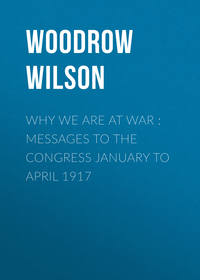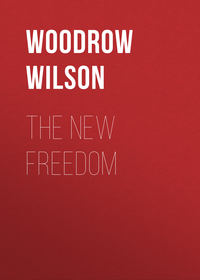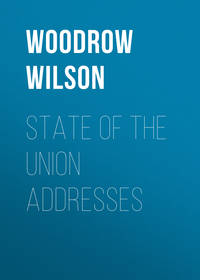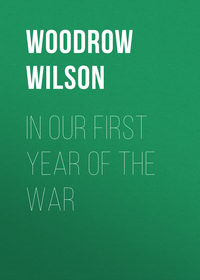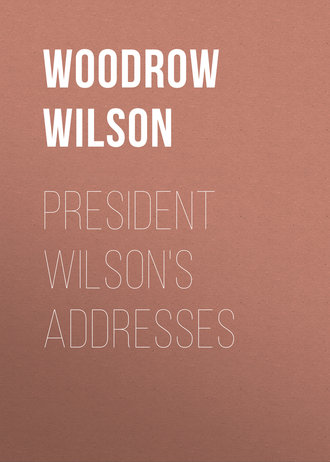 полная версия
полная версияPresident Wilson's Addresses
Nor have we studied and perfected the means by which government may be put at the service of humanity, in safeguarding the health of the Nation, the health of its men and its women and its children, as well as their rights in the struggle for existence. This is no sentimental duty. The firm basis of government is justice, not pity. These are matters of justice. There can be no equality of opportunity, the first essential of justice in the body politic, if men and women and children be not shielded in their lives, their very vitality, from the consequences of great industrial and social processes which they cannot alter, control, or singly cope with. Society must see to it that it does not itself crush or weaken or damage its own constituent parts. The first duty of law is to keep sound the society it serves. Sanitary laws, pure-food laws, and laws determining conditions of labor which individuals are powerless to determine for themselves are intimate parts of the very business of justice and legal efficiency.
These are some of the things we ought to do, and not leave the others undone, the old-fashioned, never-to-be-neglected, fundamental safeguarding of property and of individual right. This is the high enterprise of the new day: To lift everything that concerns our life as a Nation to the light that shines from the hearthfire of every man's conscience and vision of the right. It is inconceivable that we should do this as partisans; it is inconceivable we should do it in ignorance of the facts as they are or in blind haste. We shall restore, not destroy. We shall deal with our economic system as it is and as it may be modified, not as it might be if we had a clean sheet of paper to write upon; and step by step we shall make it what it should be, in the spirit of those who question their own wisdom and seek counsel and knowledge, not shallow self-satisfaction or the excitement of excursions whither they cannot tell. Justice, and only justice, shall always be our motto.
And yet it will be no cool process of mere science. The Nation has been deeply stirred, stirred by a solemn passion, stirred by the knowledge of wrong, of ideals lost, of government too often debauched and made an instrument of evil. The feelings with which we face this new age of right and opportunity sweep across our heartstrings like some air out of God's own presence, where justice and mercy are reconciled and the judge and the brother are one. We know our task to be no mere task of politics but a task which shall search us through and through, whether we be able to understand our time and the need of our people, whether we be indeed their spokesmen and interpreters, whether we have the pure heart to comprehend and the rectified will to choose our high course of action.
This is not a day of triumph; it is a day of dedication. Here muster, not the forces of party, but the forces of humanity. Men's hearts wait upon us; men's lives hang in the balance; men's hopes call upon us to say what we will do. Who shall live up to the great trust? Who dares fail to try? I summon all honest men, all patriotic, all forward-looking men, to my side. God helping me, I will not fail them, if they will but counsel and sustain me!
FIRST ADDRESS TO CONGRESS
[Delivered at a joint session of the two Houses of Congress, at the beginning of the first session of the Sixty-third Congress, April 8, 1913.]
Mr. Speaker, Mr. President, Gentlemen of the Congress:
I am very glad indeed to have this opportunity to address the two Houses directly and to verify for myself the impression that the President of the United States is a person, not a mere department of the Government hailing Congress from some isolated island of jealous power, sending messages, not speaking naturally and with his own voice—that he is a human being trying to coöperate with other human beings in a common service. After this pleasant experience I shall feel quite normal in all our dealings with one another.2
I have called the Congress together in extraordinary session because a duty was laid upon the party now in power at the recent elections which it ought to perform promptly, in order that the burden carried by the people under existing law may be lightened as soon as possible and in order, also, that the business interests of the country may not be kept too long in suspense as to what the fiscal changes are to be to which they will be required to adjust themselves. It is clear to the whole country that the tariff duties must be altered. They must be changed to meet the radical alteration in the conditions of our economic life which the country has witnessed within the last generation. While the whole face and method of our industrial and commercial life were being changed beyond recognition the tariff schedules have remained what they were before the change began, or have moved in the direction they were given when no large circumstance of our industrial development was what it is to-day. Our task is to square them with the actual facts. The sooner that is done the sooner we shall escape from suffering from the facts and the sooner our men of business will be free to thrive by the law of nature (the nature of free business) instead of by the law of legislation and artificial arrangement.
We have seen tariff legislation wander very far afield in our day—very far indeed from the field in which our prosperity might have had a normal growth and stimulation. No one who looks the facts squarely in the face or knows anything that lies beneath the surface of action can fail to perceive the principles upon which recent tariff legislation has been based. We long ago passed beyond the modest notion of "protecting" the industries of the country and moved boldly forward to the idea that they were entitled to the direct patronage of the Government. For a long time—a time so long that the men now active in public policy hardly remember the conditions that preceded it—we have sought in our tariff schedules to give each group of manufacturers or producers what they themselves thought that they needed in order to maintain a practically exclusive market as against the rest of the world. Consciously or unconsciously, we have built up a set of privileges and exemptions from competition behind which it was easy by any, even the crudest, forms of combination to organize monopoly; until at last nothing is normal, nothing is obliged to stand the tests of efficiency and economy, in our world of big business, but everything thrives by concerted arrangement. Only new principles of action will save us from a final hard crystallization of monopoly and a complete loss of the influences that quicken enterprise and keep independent energy alive.
It is plain what those principles must be. We must abolish everything that bears even the semblance of privilege or of any kind of artificial advantage, and put our business men and producers under the stimulation of a constant necessity to be efficient, economical, and enterprising, masters of competitive supremacy, better workers and merchants than any in the world. Aside from the duties laid upon articles which we do not, and probably cannot, produce, therefore, and the duties laid upon luxuries and merely for the sake of the revenues they yield, the object of the tariff duties henceforth laid must be effective competition, the whetting of American wits by contest with the wits of the rest of the world.
It would be unwise to move toward this end headlong, with reckless haste, or with strokes that cut at the very roots of what has grown up amongst us by long process and at our own invitation. It does not alter a thing to upset it and break it and deprive it of a chance to change. It destroys it. We must make changes in our fiscal laws, in our fiscal system, whose object is development, a more free and wholesome development, not revolution or upset or confusion. We must build up trade, especially foreign trade. We need the outlet and the enlarged field of energy more than we ever did before. We must build up industry as well, and must adopt freedom in the place of artificial stimulation only so far as it will build, not pull down. In dealing with the tariff the method by which this may be done will be a matter of judgment, exercised item by item. To some not accustomed to the excitements and responsibilities of greater freedom our methods may in some respects and at some points seem heroic, but remedies may be heroic and yet be remedies. It is our business to make sure that they are genuine remedies. Our object is clear. If our motive is above just challenge and only an occasional error of judgment is chargeable against us, we shall be fortunate.
We are called upon to render the country a great service in more matters than one. Our responsibility should be met and our methods should be thorough, as thorough as moderate and well considered, based upon the facts as they are, and not worked out as if we were beginners. We are to deal with the facts of our own day, with the facts of no other, and to make laws which square with those facts. It is best, indeed it is necessary, to begin with the tariff. I will urge nothing upon you now at the opening of your session which can obscure that first object or divert our energies from that clearly defined duty. At a later time I may take the liberty of calling your attention to reforms which should press close upon the heels of the tariff changes, if not accompany them, of which the chief is the reform of our banking and currency laws; but just now I refrain. For the present, I put these matters on one side and think only of this one thing—of the changes in our fiscal system which may best serve to open once more the free channels of prosperity to a great people whom we would serve to the utmost and throughout both rank and file.
I thank you for your courtesy.
ADDRESS ON THE BANKING SYSTEM
[Delivered at a joint session of the two Houses of Congress, June 23, 1913.]
Mr. Speaker, Mr. President, Gentlemen of the Congress:
It is under the compulsion of what seems to me a clear and imperative duty that I have a second time this session sought the privilege of addressing you in person. I know, of course, that the heated season of the year is upon us, that work in these chambers and in the committee rooms is likely to become a burden as the season lengthens, and that every consideration of personal convenience and personal comfort, perhaps, in the cases of some of us, considerations of personal health even, dictate an early conclusion of the deliberations of the session; but there are occasions of public duty when these things which touch us privately seem very small, when the work to be done is so pressing and so fraught with big consequence that we know that we are not at liberty to weigh against it any point of personal sacrifice. We are now in the presence of such an occasion. It is absolutely imperative that we should give the business men of this country a banking and currency system by means of which they can make use of the freedom of enterprise and of individual initiative which we are about to bestow upon them.
We are about to set them free; we must not leave them without the tools of action when they are free. We are about to set them free by removing the trammels of the protective tariff. Ever since the Civil War they have waited for this emancipation and for the free opportunities it will bring with it. It has been reserved for us to give it to them. Some fell in love, indeed, with the slothful security of their dependence upon the Government; some took advantage of the shelter of the nursery to set up a mimic mastery of their own within its walls. Now both the tonic and the discipline of liberty and maturity are to ensue. There will be some readjustments of purpose and point of view. There will follow a period of expansion and new enterprise, freshly conceived. It is for us to determine now whether it shall be rapid and facile and of easy accomplishment. This it cannot be unless the resourceful business men who are to deal with the new circumstances are to have at hand and ready for use the instrumentalities and conveniences of free enterprise which independent men need when acting on their own initiative.
It is not enough to strike the shackles from business. The duty of statesmanship is not negative merely. It is constructive also. We must show that we understand what business needs and that we know how to supply it. No man, however casual and superficial his observation of the conditions now prevailing in the country, can fail to see that one of the chief things business needs now, and will need increasingly as it gains in scope and vigor in the years immediately ahead of us, is the proper means by which readily to vitalize its credit, corporate and individual, and its originative brains. What will it profit us to be free if we are not to have the best and most accessible instrumentalities of commerce and enterprise? What will it profit us to be quit of one kind of monopoly if we are to remain in the grip of another and more effective kind? How are we to gain and keep the confidence of the business community unless we show that we know how both to aid and to protect it? What shall we say if we make fresh enterprise necessary and also make it very difficult by leaving all else except the tariff just as we found it? The tyrannies of business, big and little, lie within the field of credit. We know that. Shall we not act upon the knowledge? Do we not know how to act upon it? If a man cannot make his assets available at pleasure, his assets of capacity and character and resource, what satisfaction is it to him to see opportunity beckoning to him on every hand, when others have the keys of credit in their pockets and treat them as all but their own private possession? It is perfectly clear that it is our duty to supply the new banking and currency system the country needs, and it will need it immediately more than it has ever needed it before.
The only question is, When shall we supply it—now, or later, after the demands shall have become reproaches that we were so dull and so slow? Shall we hasten to change the tariff laws and then be laggards about making it possible and easy for the country to take advantage of the change? There can be only one answer to that question. We must act now, at whatever sacrifice to ourselves. It is a duty which the circumstances forbid us to postpone. I should be recreant to my deepest convictions of public obligation did I not press it upon you with solemn and urgent insistence.
The principles upon which we should act are also clear. The country has sought and seen its path in this matter within the last few years—sees it more clearly now than it ever saw it before—much more clearly than when the last legislative proposals on the subject were made. We must have a currency, not rigid as now, but readily, elastically responsive to sound credit, the expanding and contracting credits of everyday transactions, the normal ebb and flow of personal and corporate dealings. Our banking laws must mobilize reserves; must not permit the concentration anywhere in a few hands of the monetary resources of the country or their use for speculative purposes in such volume as to hinder or impede or stand in the way of other more legitimate, more fruitful uses. And the control of the system of banking and of issue which our new laws are to set up must be public, not private, must be vested in the Government itself, so that the banks may be the instruments, not the masters, of business and of individual enterprise and initiative.
The committees of the Congress to which legislation of this character is referred have devoted careful and dispassionate study to the means of accomplishing these objects. They have honored me by consulting me. They are ready to suggest action. I have come to you, as the head of the Government and the responsible leader of the party in power, to urge action now, while there is time to serve the country deliberately and as we should, in a clear air of common counsel. I appeal to you with a deep conviction of duty. I believe that you share this conviction. I therefore appeal to you with confidence. I am at your service without reserve to play my part in any way you may call upon me to play it in this great enterprise of exigent reform which it will dignify and distinguish us to perform and discredit us to neglect.
ADDRESS AT GETTYSBURG
[Delivered in the presence of Union and Confederate veterans, on the occasion of the fiftieth anniversary of the battle, July 4, 1913.]
Friends and Fellow Citizens:
I need not tell you what the Battle of Gettysburg meant. These gallant men in blue and gray sit all about us here.3 Many of them met upon this ground in grim and deadly struggle. Upon these famous fields and hillsides their comrades died about them. In their presence it were an impertinence to discourse upon how the battle went, how it ended, what it signified! But fifty years have gone by since then, and I crave the privilege of speaking to you for a few minutes of what those fifty years have meant.
What have they meant? They have meant peace and union and vigor, and the maturity and might of a great nation. How wholesome and healing the peace has been! We have found one another again as brothers and comrades in arms, enemies no longer, generous friends rather, our battles long past, the quarrel forgotten—except that we shall not forget the splendid valor, the manly devotion of the men then arrayed against one another, now grasping hands and smiling into each other's eyes. How complete the union has become and how dear to all of us, how unquestioned, how benign and majestic, as State after State has been added to this our great family of free men! How handsome the vigor, the maturity, the might of the great Nation we love with undivided hearts; how full of large and confident promise that a life will be wrought out that will crown its strength with gracious justice and with a happy welfare that will touch all alike with deep contentment! We are debtors to those fifty crowded years; they have made us heirs to a mighty heritage.
But do we deem the Nation complete and finished? These venerable men crowding here to this famous field have set us a great example of devotion and utter sacrifice. They were willing to die that the people might live. But their task is done. Their day is turned into evening. They look to us to perfect what they established. Their work is handed on to us, to be done in another way, but not in another spirit. Our day is not over; it is upon us in full tide.
Have affairs paused? Does the Nation stand still? Is what the fifty years have wrought since those days of battle finished, rounded out, and completed? Here is a great people, great with every force that has ever beaten in the lifeblood of mankind. And it is secure. There is no one within its borders, there is no power among the nations of the earth, to make it afraid. But has it yet squared itself with its own great standards set up at its birth, when it made that first noble, naïve appeal to the moral judgment of mankind to take notice that a government had now at last been established which was to serve men, not masters? It is secure in everything except the satisfaction that its life is right, adjusted to the uttermost to the standards of righteousness and humanity. The days of sacrifice and cleansing are not closed. We have harder things to do than were done in the heroic days of war, because harder to see clearly, requiring more vision, more calm balance of judgment, a more candid searching of the very springs of right.
Look around you upon the field of Gettysburg! Picture the array, the fierce heats and agony of battle, column hurled against column, battery bellowing to battery! Valor? Yes! Greater no man shall see in war; and self-sacrifice, and loss to the uttermost; the high recklessness of exalted devotion which does not count the cost. We are made by these tragic, epic things to know what it costs to make a nation—the blood and sacrifice of multitudes of unknown men lifted to a great stature in the view of all generations by knowing no limit to their manly willingness to serve. In armies thus marshaled from the ranks of free men you will see, as it were, a nation embattled, the leaders and the led, and may know, if you will, how little except in form its action differs in days of peace from its action in days of war.
May we break camp now and be at ease? Are the forces that fight for the Nation dispersed, disbanded, gone to their homes forgetful of the common cause? Are our forces disorganized, without constituted leaders and the might of men consciously united because we contend, not with armies, but with principalities and powers and wickedness in high places? Are we content to lie still? Does our union mean sympathy, our peace contentment, our vigor right action, our maturity self-comprehension and a clear confidence in choosing what we shall do? War fitted us for action, and action never ceases.
I have been chosen the leader of the Nation. I cannot justify the choice by any qualities of my own, but so it has come about, and here I stand. Whom do I command? The ghostly hosts who fought upon these battlefields long ago and are gone? These gallant gentlemen stricken in years whose fighting days, are over, their glory won? What are the orders for them, and who rallies them? I have in my mind another host, whom these set free of civil strife in order that they might work out in days of peace and settled order the life of a great Nation. That host is the people themselves, the great and the small, without class or difference of kind or race or origin; and undivided in interest, if we have but the vision to guide and direct them and order their lives aright in what we do. Our constitutions are their articles of enlistment. The orders of the day are the laws upon our statute books. What we strive for is their freedom, their right to lift themselves from day to day and behold the things they have hoped for, and so make way for still better days for those whom they love who are to come after them. The recruits are the little children crowding in. The quartermaster's stores are in the mines and forests and fields, in the shops and factories. Every day something must be done to push the campaign forward; and it must be done by plan and with an eye to some great destiny.
How shall we hold such thoughts in our hearts and not be moved? I would not have you live even to-day wholly in the past, but would wish to stand with you in the light that streams upon us now out of that great day gone by. Here is the nation God has builded by our hands. What shall we do with it? Who stands ready to act again and always in the spirit of this day of reunion and hope and patriotic fervor? The day of our country's life has but broadened into morning. Do not put uniforms by. Put the harness of the present on. Lift your eyes to the great tracts of life yet to be conquered in the interest of righteous peace, of that prosperity which lies in a people's hearts and outlasts all wars and errors of men. Come, let us be comrades and soldiers yet to serve our fellow-men in quiet counsel, where the blare of trumpets is neither heard nor heeded and where the things are done which make blessed the nations of the world in peace and righteousness and love.
ADDRESS ON MEXICAN AFFAIRS
[Delivered at a joint session of the two Houses of Congress, August 27, 1913.]
Gentlemen of the Congress:
It is clearly my duty to lay before you, very fully and without reservation, the facts concerning our present relations with the Republic of Mexico. The deplorable posture of affairs in Mexico I need not describe,4 but I deem it my duty to speak very frankly of what this Government has done and should seek to do in fulfillment of its obligation to Mexico herself, as a friend and neighbor, and to American citizens whose lives and vital interests are daily affected by the distressing conditions which now obtain beyond our southern border.
Those conditions touch us very nearly. Not merely because they lie at our very doors. That of course makes us more vividly and more constantly conscious of them, and every instinct of neighborly interest and sympathy is aroused and quickened by them; but that is only one element in the determination of our duty. We are glad to call ourselves the friends of Mexico, and we shall, I hope, have many an occasion, in happier times as well as in these days of trouble and confusion, to show that our friendship is genuine and disinterested, capable of sacrifice and every generous manifestation. The peace, prosperity, and contentment of Mexico mean more, much more, to us than merely an enlarged field for our commerce and enterprise. They mean an enlargement of the field of self-government and the realization of the hopes and rights of a nation with whose best aspirations, so long suppressed and disappointed, we deeply sympathize. We shall yet prove to the Mexican people that we know how to serve them without first thinking how we shall serve ourselves.



